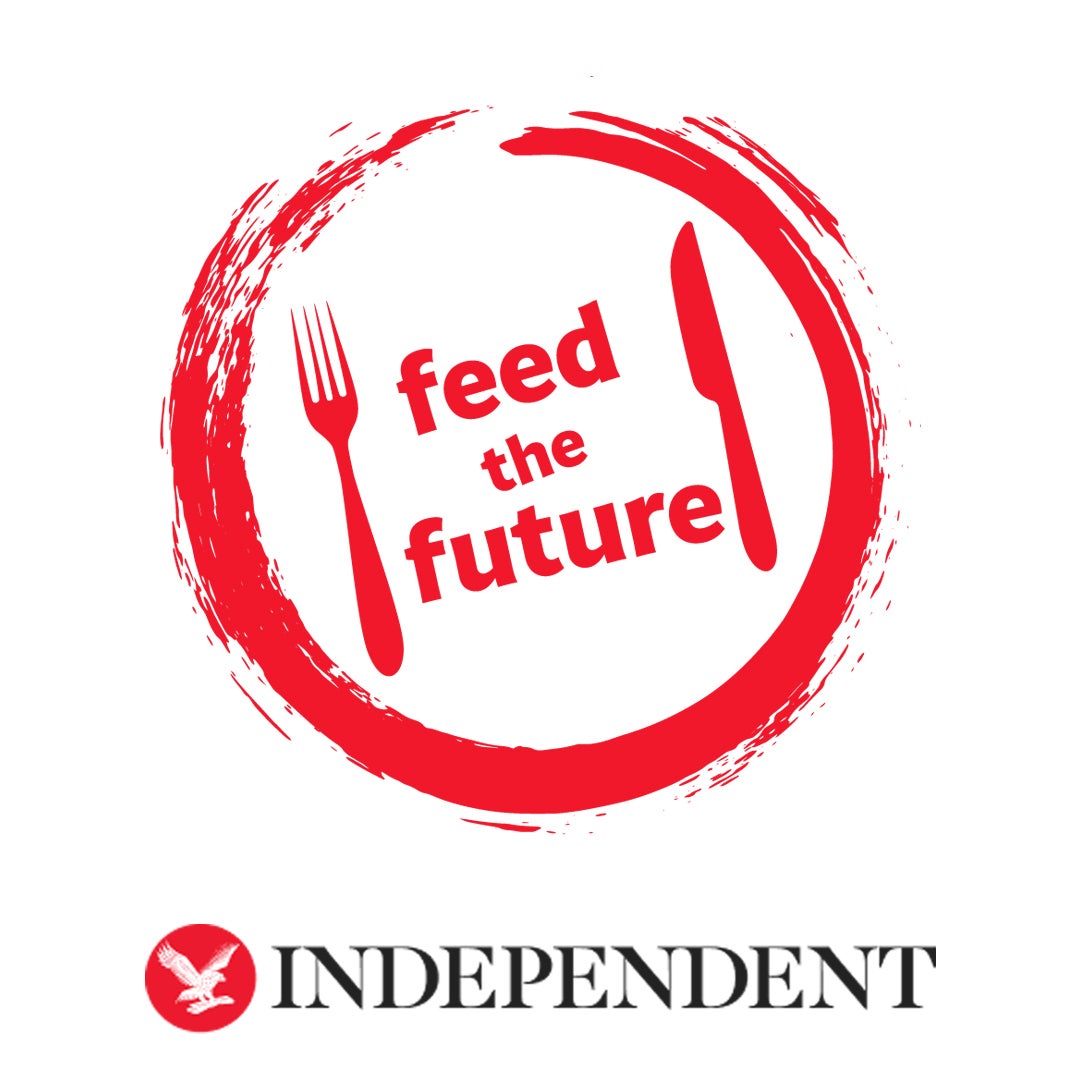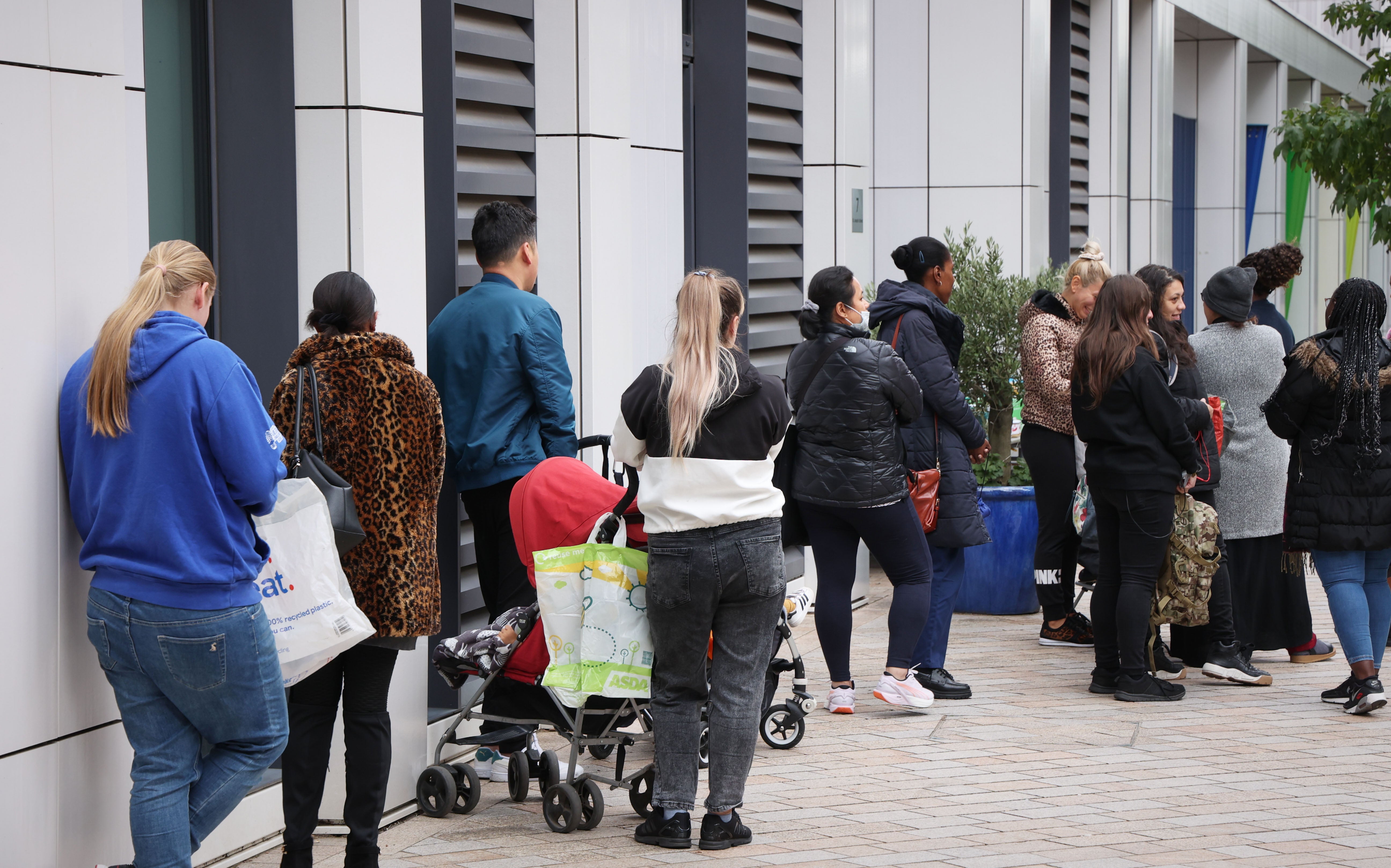‘It’s too expensive to eat lunch and feed my children’: The rise of the school food bank
Feed the Future: Demand for help putting food on the table continues to grow – hence The Independent’s call for free school meals to urgently be extended to all those in need
Your support helps us to tell the story
This election is still a dead heat, according to most polls. In a fight with such wafer-thin margins, we need reporters on the ground talking to the people Trump and Harris are courting. Your support allows us to keep sending journalists to the story.
The Independent is trusted by 27 million Americans from across the entire political spectrum every month. Unlike many other quality news outlets, we choose not to lock you out of our reporting and analysis with paywalls. But quality journalism must still be paid for.
Help us keep bring these critical stories to light. Your support makes all the difference.
The queue began 45 minutes before the opening of the weekly school food bank. It started outside the glass-fronted school entrance, snaked along the wall and, by the time produce-laden tables are assembled at 3.15pm, winds around the corner into the next street.
To make change happen, please sign the petition by clicking here
This is a typical Wednesday afternoon at St Mary’s RC Primary, a school in the shadow of the multibillion-pound Battersea Power Station development but where 50 per cent of the 195 pupils are on free school meals. And yet the bulk of parents in the queue are neither the jobless nor on the lowest incomes.
Towards the front waits Shawn, 45, a single mother of two and a phlebotomist who works part-time, 20 hours a week, preparing blood for testing at a doctor’s laboratory and whose daughter does not get free school meals. Shawn says: “I am on universal credit because I earn so little but as my income is above the government threshold of £7,400 a year, my daughter [in year 3] does not get free school meals. I also have a second child, aged three, to feed and I come to the food bank every week. I come early because this queue can get long. I aim to get at least one day’s meals.”
I watch Shawn load up her carrier bag with pasta, cereal, eggs, rice, yoghurt, lemon, tinned peas and tomatoes. “This is a good variety, it helps us a great deal,” she says. Shawn has skipped lunch, as she does every day. “It is too expensive to eat three meals a day and feed my children,” she adds. “A year ago, I would spend £50 a week on groceries, now that has doubled. The food bank helps me get by.”
Behind her stands Maryam, 38, also a working single mother on universal credit whose daughter similarly does not qualify for free school meals. “I work 28 hours a week for the criminal justice system assessing offenders with drug alcohol issues and recommending sentencing,” she says. “My job is stressful and to not have free school meals adds to my anxiety. I have lost three teeth and can’t afford the dental work to replace them.”

She adds: “I am even more worried about my best friend who is in a worse situation and can’t afford to feed her children. I often subsidise her. She works part-time for a car dealership and has three children who don’t get free school meals because she is above the threshold. One of her children has autism. This is a good mother who urgently needs help.”
Shawn and Maryam are two of around 50 parents who rely on the weekly school food bank which is supplied by City Harvest, London’s second biggest food surplus distributor, and supplemented with long-life produce by the Wimbledon Dons Local Action Group. Both cases highlight the importance of our call for the prime minister to extend free school meals to all 800,000 children in England living in households receiving universal credit.
Executive head of St Mary’s, Jared Brading, puts the food bank in context. “We started it during the Covid pandemic and what we are seeing is that there is a tier above the free school meal parents who tend to work part-time in low-wage jobs whose children are not entitled to free school meals and who are struggling the most. I would say about 20 per cent of our families are in this hidden working poverty category. They are probably the biggest users of our food bank. Within 45 minutes or so, all the food we have laid out will be gone. We are about to start a Monday food bank as well in order to give parents the help they need two days a week.”
London’s two biggest food redistribution charities, The Felix Project and City Harvest, together deliver fresh produce to 187 food banks set up in schools in the capital, comprising 50 tonnes a week. The equivalent of more than 115,000 meals. Nationally, the FareShare redistribution network supplied 646 schools and 274 out-of-school clubs with 1,377 tonnes of food in the five months to August this year.
The Felix Project report that the number of school food banks they supply in London has doubled in the last three years, to 166. While City Harvest say their numbers have “almost doubled”. This against a backdrop in which 2.5 million people accessed food banks in 2020-21 across England, up almost 31 per cent from the previous year.

Steve Winningham, CEO of City Harvest, says: "School food banks are on the rise. Beginning in Covid, these hubs served people trying to support their families, especially without access to free school meals. We have seen our numbers almost double in the last two years. All our food banks would take 50 per cent more food if we had it to give. A quarter of our charities recently asked for a second delivery each week. The demand is unprecedented."
One school food bank supplied by The Felix Project is at Mandeville Primary in Hackney, where 62 per cent of the pupils are eligible for free school meals with the remaining 38 per cent classed as working poor. Every Monday, around 80 families line up to collect food. Again, it is the working parents who arrive first with some loading up prams with strawberries, tomatoes, aubergines and cabbages.
One father of two, Rock, 53, a caretaker at a local estate, swings a bin bag that he has filled with vegetables, juice and mayonnaise over his shoulders. “I come every week,” he says. “We struggle to have enough food for the children because everything is going up except my salary. My 11-year-old got free school meals because Mandeville gives a free lunch to everyone, but now she has started secondary school, she will no longer be eligible so we will have to find money for her school lunches. I worry - will they let me continue to come to the food bank? It’s going to be twice as tough.”
Mandeville’s associate headteacher Marc Thompson says: “This is a proud community and people don’t openly talk about hunger, but demand for our food bank is high. The biggest issue at the start was the stigma of letting people know you’re on the breadline, but that is less the case now because many are struggling. We had to stop parents taking extra for families whose children are not at Mandeville or have never been. We spotted it because their containers grew from bags to shopping trolleys to several shopping trolleys. It was painful to do this because we see ourselves as a community school. Something urgent needs to be done.”
Both heads say they support our Feed the Future campaign. Thompson says: “The idea of children coming to school and being unable to access a healthy lunch is horrendous. There is a strong link between children who struggle and the quality of food in their lunch boxes. This campaign is something we very much support.”
Brading says: “There are untold studies that prove that a child’s ability to concentrate is impacted by whether they have been properly fed. Extending free school meals to all children living in households in poverty should be seen by those in power as an investment in the future of this country. It’s providing our children with a basic human right.”
Subscribe to Independent Premium to bookmark this article
Want to bookmark your favourite articles and stories to read or reference later? Start your Independent Premium subscription today.






Join our commenting forum
Join thought-provoking conversations, follow other Independent readers and see their replies
Comments